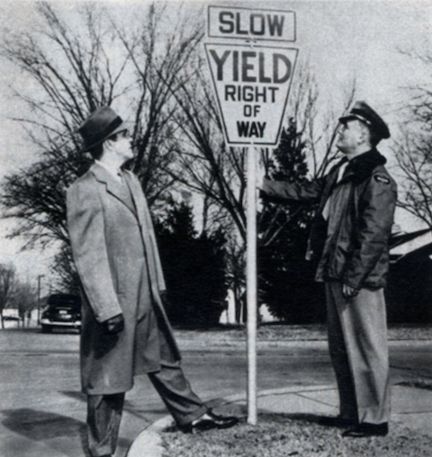Yielding to Avoid a Crash or a Clash
Oklahoma highway patrolman Clinton Riggs was a student at the Northwestern University Traffic Institute, now the Center for Public Safety, in 1939 when he created the yield sign as a class assignment. The original yield sign was keystone shaped and read, “Yield Right of Way” in black letters on a bright, yellow background. Yellow was used because reflective material was not yet available and it was the most visible color at night.

*photo credit unknown
Riggs’ goal was to improve public safety and determine liability in an accident. In 1950, as a member of the Tulsa Police Department, Riggs placed the first yield sign at the most dangerous intersection in the city. Within a year, the number of accidents fell to zero. By 1954, the Manual on Uniform Traffic Control Devices added the yield sign to similar right-of-way intersections. Yield signs soon appeared at intersections across the country, with the keystone shape being replaced with an upside-down triangle with black lettering and a border, but the sign remained yellow. Over time, the signs began only saying “yield.”
Yielding not only helps us be better, safer, and more cnsiderate drivers. Yielding to God, to God's Word, to the Holy Spirit, and yeilding to each other helps us become better disciples of Jesus, children of God, and brothers and sisters to each other!
Oh the crashes and clashes we could avoid if we would just yield to the wisdom and commands of the Lord, and to the needs or preferences of others!
"Trust in the LORD with all your heart and lean not on your own understanding; in all your ways submit [YIELD!] to him, and he will make your paths straight" (Proverbs 3:5-6, NIV).
"Submit [YIELD!] yourselves therefore to God. Resist the devil, and he will flee from you" (James 4:7, ESV).
“You stiff-necked people, uncircumcised in heart and ears, you always resist [fail to YIELD] the Holy Spirit. As your fathers did, so do you" (Acts 7:51, ESV).
"Submitting [YIELDING] to one another out of reverence for Christ" (Ephesians 5:21, ESV).
Seven Foot Tall and Bulletproof
History is replete with examples of bad people with bad intentions doing bad things to people. But have you ever noticed how often those bad intentions are turned on their proverbial heads, resulting in remarkable good? A quick AI search brings countless cases in point:
John Bunyan’s Imprisonment – Arrested for preaching without a license in 17th-century England, Bunyan spent 12 years in jail. During that time, he wrote The Pilgrim’s Progress, one of the most influential Christian books ever published.
Dietrich Bonhoeffer – A German pastor and theologian, Bonhoeffer was imprisoned and eventually executed for his resistance to the Nazi regime. Yet his writings from prison, especially Letters and Papers from Prison, have inspired generations with their depth and courage.
The Apostle Paul – Much of the New Testament was written while Paul was imprisoned. His letters to early churches—written under duress—have shaped Christian theology and practice for centuries.
Richard Wurmbrand – A Romanian pastor imprisoned for 14 years under a communist regime for his faith. While suffering in solitary confinement and torture, he composed sermons in his mind to stay sane. After his release, he founded The Voice of the Martyrs, a ministry that now supports persecuted Christians worldwide.
Harriet Tubman – Born into slavery, Tubman endured unimaginable hardship. But after escaping, she returned again and again to rescue others via the Underground Railroad. The evil of slavery became the backdrop for her extraordinary courage and legacy of liberation.
In each of these examples, we see men and women stripped of their power, laid wholly vulnerable to the forces bearing against them for their harm.
These stories remind us that while evil may intend to destroy, it often becomes the very soil where resilience, purpose, and grace take root.
So what do these stories all have in common? In each of these cases, we see men and women of God submitting themselves to His higher purposes.
Submitting ourselves to God is important for many reasons, but chief among them is the key role it plays in allowing us to experience God's goodness.
In one classic OT example, we read the story of how Joseph's brothers became jealous of him and sold him into slavery. They perpetrated this crime against Joseph with nothing but bad intentions.

The remarkable part of the story was how Joseph chose to respond to his circumstances. Rather than becoming angry or bitter or playing the victim, Joseph submitted himself to a God Who had nothing but his best interests in mind. Because he submitted himself to God in the midst of his trial, it really didn't matter what his brothers’ intentions were.
By committing Himself to God, Joseph allowed God's good intentions to override the bad intentions of his brothers.
It is important to note that it was only because Joseph responded the way he did that he was able to overcome his circumstances and experience God's good intentions. The same is true for all of us.
As we live out our lives, we will be met by forces that do not have our best interests in mind. And just as Joseph was outnumbered and overpowered by his brothers, so it will be for us. At these times, we will seem to have no choice but to be subject to the forces that have marshaled themselves against us.
But we will have a choice!
Like Joseph, we will still have the option of committing ourselves to God, the choice to endure our circumstances with an attitude of humble submission.
The bottom line is God takes care of whatever we entrust to Him. So long as we yield ourselves to Him, it really doesn't matter what bad intentions come our way. We don't have to outsmart or outmaneuver every bad guy in our world. All we have to do is dedicate ourselves to God, without reservation.
When we have given all that we have and all that we are to God, the bad intentions of others can't possibly prevail against us. We are seven feet tall and bullet proof!
As Joseph explained to his brothers, "You intended to harm me, but God intended it all for good. He brought me to this position so I could save the lives of many people" (Genesis 50:20, NLT).
"And we know that in all things God works for the good of those who love him, who have been called according to his purpose" (Romans 8:28).
Trusting God with Time
We all want to be Dr. Strange.
In the Marvel Cinematic Universe, there are six infinity stones. They are a group of cosmic gems that grant their owner great power. One of these six stones is the Time Stone.

The time stone grants its owner the power to rewind and fast-forward time. Dr. Strange discovered the stone in his origin movie, using it to trap the villain Dormammu in a time loop so that Dormammmu couldn't destroy earth. Then, he wears the stone throughout Infinity War.
But Thanos, a powerful, purple humonoid with superhuman strength and power, "used the Infinity Stones to 'snap' his fingers, which resulted in the instantaneous destruction of half of all life in the universe, effectively wiping out half of all living beings across the cosmos."
As the good guys are fighting the villain Thanos and his army, Dr. Strange tells Iron Man that if he has to choose between giving up the stone and saving the lives of the Avengers, he’ll prioritize the stone. Yet, later in Infinity War, he uses the power of the Time Stone to look into the many possible futures that could play out. He gleans from this knowledge that he will have to give up the stone to Thanos in order for the Avengers to eventually defeat him.
Like Dr. Strange, who wouldn't want to control time? In a way, by controlling time, you could effectively control everything else, because you could leap from from past to present, righting wrongs or forseeing future disasters and averting them.
Yet it is only as we give up trying to control everything, as Dr. Strange gave up the power of the Time Stone to save the universe, that we’ll find a release of freedom to simply trust God and enjoy life here in the present.
As Psalm 90:12 says, "Teach us to number our days, that we may gain a heart of wisdom" (NIV).
And as the Lord Himself said, "Therefore do not worry about tomorrow, for tomorrow will worry about itself. Each day has enough trouble of its own" (Matthew 6:34, NIV).